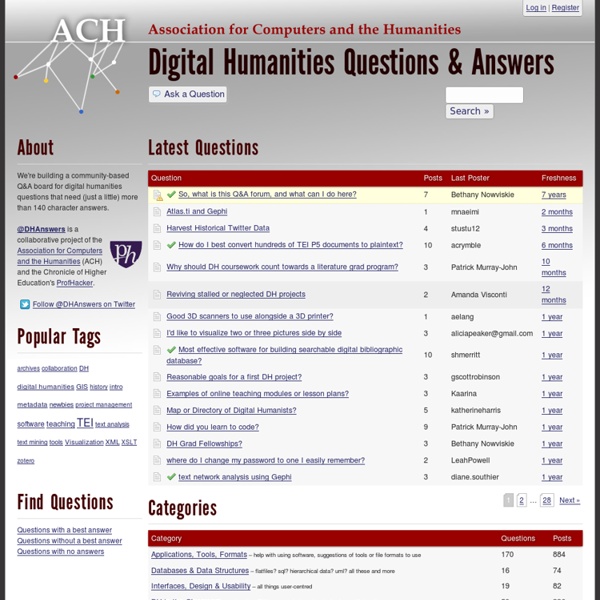



The Future of Archives in a Digital Age Scholarship and teaching in the humanities are undergoing a seismic shift, from a culture once based almost entirely on in-person and printed exchange to one reliant on a combination of traditional communications and digital technologies. It is a time of excitement for many and of skepticism for others. What does it mean that for many the most used "libraries" have become "digital"? What are the implications for the development of knowledge at a time when vast amounts of data have not been made available in digital formats? Print for the People, a Mizzou Advantage networking group on digital humanities, is considering these questions. We will host, "The Future of Archives in a Digital Age," on February 24–25, 2011, with keynote addresses by Robert Darnton, Director of the University Library at Harvard, and William Ferris, former chairman of the National Endowment for the Humanities.
Granted, and... | thoughts on education by Grant Wiggins Digital Humanities Pedagogy - Open Book Publishers Academic institutions are starting to recognize the growing public interest in digital humanities research, and there is an increasing demand from students for formal training in its methods. Despite the pressure on practitioners to develop innovative courses, scholarship in this area has tended to focus on research methods, theories and results rather than critical pedagogy and the actual practice of teaching. The essays in this collection offer a timely intervention in digital humanities scholarship, bringing together established and emerging scholars from a variety of humanities disciplines across the world. Digital Humanities pedagogy broadens the ways in which both scholars and practitioners can think about this emerging discipline, ensuring its ongoing development, vitality and long-term sustainability.
Digital History Authentic Education - Welcome to Authentic Education Guidelines for the Evaluation of Digital Scholarship in History Download the Guidelines (PDF) Defining the Challenge The context of historical scholarship is changing rapidly and profoundly. Disciplines and universities that emerged two centuries ago in a profusion of print now find themselves confronted with new digital forms. Historical scholarship is, of course, already digital in many ways. Despite this ferment, broadly accepted guidelines for the professional evaluation of digital scholarship have not yet emerged. The American Historical Association has established this committee to help ensure that our profession acts in far-sighted ways as the digital presence grows. The AHA offers “a broad working definition of digital history” as “scholarship that is either produced using computational tools and methods or presented using digital technologies.” At its heart, scholarship is a documented and disciplined conversation about matters of enduring consequence. Forms and Functions of Digital Scholarship Roles and Responsibilities
Play The Past | MARSOUIN.ORG Tooling Up for Digital Humanities ProfHacker Many of us have favorite tools that suit our workflows well, helping us accomplish our tasks and keep track of needed bits of information. Below you’ll find a list of applications, services, and utilities that I use almost daily. Workflow. I’m a big fan of ToDoist, my preferred task manager. For the way I work, it’s a better option than Apple’s Reminders. I know I know. Let’s backtrack a minute. A few weeks ago, coincidentally during Day of DH 2016, it was brought to my attention that Voyant, a web-based text analysis tool, had upgraded to Version 2.0. This has been a popular tool with ProfHackers (I’ve written about using it as has Brian), and the new version is a great improvement. a cleaner, crisper appearance better cross-platform and mobile device support (all tools in HTML5, no Flash or Java Applets) advanced search capabilities, including wil… Last week, I introduced readers to Installatron, a tool that’s very useful for backing up and cloning WordPress installations.
Writing History in the Digital Age Digital History: A Guide to Gathering, Preserving, and Presenting the Past on the Web This book provides a plainspoken and thorough introduction to the web for historians—teachers and students, archivists and museum curators, professors as well as amateur enthusiasts—who wish to produce online historical work, or to build upon and improve the projects they have already started in this important new medium. It begins with an overview of the different genres of history websites, surveying a range of digital history work that has been created since the beginning of the web. The book then takes the reader step-by-step through planning a project, understanding the technologies involved and how to choose the appropriate ones, designing a site that is both easy-to-use and scholarly, digitizing materials in a way that makes them web-friendly while preserving their historical integrity, and how to reach and respond to an intended audience effectively. On this website, we present a free online version of the text. , Barnes and Noble, or U. of Penn.